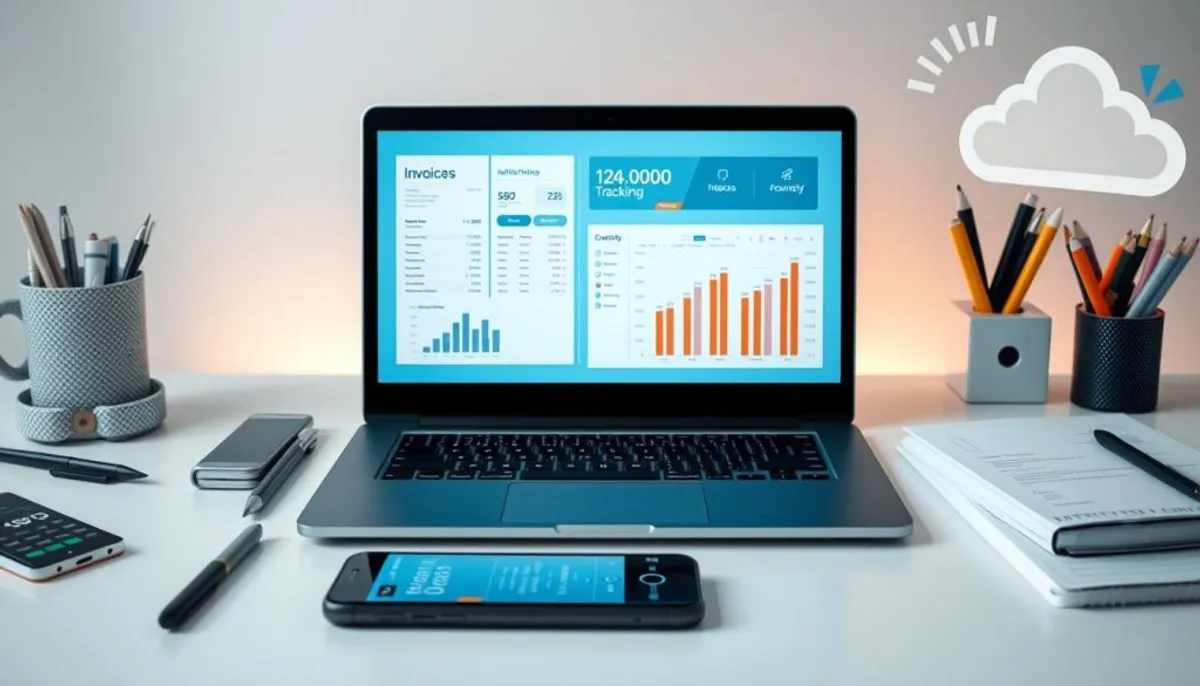Cash flow is the lifeblood of any small business. Yet, managing overdue invoices can be a daunting task. Effective debt recovery for small business is crucial for maintaining financial stability and fostering growth. Many entrepreneurs struggle with unpaid invoices, which can severely impact their operations and future prospects.
Small business cash flow improvement often hinges on efficient overdue invoice management. This process involves timely follow-ups, clear communication, and sometimes, professional assistance. Implementing robust strategies for debt recovery can make the difference between thriving and merely surviving in today’s competitive market.

American Profit Recovery, a leader in the field since 2004, offers tailored debt collection services for small businesses. They specialize in helping plumbers, electricians, contractors, and HVAC professionals recover unpaid debts efficiently. Their affordable approach ensures that small business owners can keep more of their hard-earned money while resolving late payments quickly.
With their online portal, APRweb, small business owners can manage their debt collections 24/7. This accessible platform allows for real-time monitoring of account activities and progress, putting control back in the hands of entrepreneurs. The agency’s commitment to treating everyone with dignity and respect has earned them praise from both clients and consumers alike.
Late payments can severely disrupt small business finances. We will examine how unpaid invoices influence cash flow and overall business health.
Unpaid invoices beyond 30 days significantly burden small businesses. A 2023 World Bank study indicates that businesses with substantial outstanding balances experience a 2.5% increase in borrowing costs. This necessitates 31% of small businesses to seek external financing at interest rates ranging from 4-6%, exacerbating their financial strain.
Late payments pose significant cash flow challenges. The US Chamber of Commerce discovered that 60% of businesses lose clients due to payment delays, resulting in an average loss of $10,000 in revenue. These setbacks hinder the ability to meet daily expenses and invest in growth, underscoring the necessity for effective accounts receivable optimization.
Delayed payments hinder business growth. The UK Small Business Federation reports that 34% of small businesses face project delays averaging 2 weeks due to late payments. This has a ripple effect on productivity, client relationships, and overall business stability. Implementing strategies for small business cash flow improvement is essential for long-term success.
Small businesses encounter distinct hurdles in debt recovery. It is imperative to employ effective debt collection strategies to sustain cash flow and ensure business stability. Implementing delinquent debt recovery techniques can significantly enhance financial health, allowing for business growth.
Accurate debtor information is a cornerstone of successful debt recovery. This encompasses social security numbers, driver’s licenses, phone numbers, employment details, and reference contacts. Possessing this data facilitates the collection process, elevating the probability of successful recovery.
Adopting credit control best practices involves collaborating with collection agencies that leverage cutting-edge technologies. Web portals, automated payment solutions, and virtual agents provide diverse payment avenues to debtors, enhancing recovery prospects. These technologies also enable the monitoring of recovery strategies, offering insights into the collection process.
Formal demand letters are pivotal in debt recovery. They articulate payment expectations and potential repercussions, adhering to federal and state regulations. This method establishes a foundation for further actions if required.
By adopting these debt recovery strategies, small businesses can bolster their financial stability and concentrate on growth. It is essential to harmonize collection efforts with customer retention strategies. This balance ensures the preservation of valuable relationships while recovering outstanding debts.
For small businesses, effective invoice management is paramount to maintain a healthy cash flow and optimize accounts receivable. Implementing robust systems streamlines processes and enhances financial health.
Clear payment terms are the cornerstone of successful overdue invoice management. Establishing unambiguous terms is essential. These should include due dates, accepted payment methods, and late fee policies. Such clarity prevents misunderstandings and fosters timely payments.
Modern digital solutions are crucial for optimizing accounts receivable. They provide real-time updates on invoice status, automate reminders, and minimize errors. By adopting these technologies, businesses can significantly enhance their invoicing efficiency.

Identifying early warning signs of payment problems is vital for effective credit control. Daily monitoring of accounts receivable and observing patterns such as consistently late payments or sudden changes in customer behavior are key. Prompt action on these signs can avert minor issues from becoming major financial hurdles.
By concentrating on these critical areas, businesses can substantially improve their invoice management systems. This leads to better cash flow and reduced financial stress.
Small businesses are often faced with a critical decision regarding debt recovery. They must weigh the benefits of professional debt collection services against automated systems. Professional services bring expertise in managing unpaid invoices, while automated systems excel in tracking and sending reminders. Both aim to enhance cash flow and alleviate the financial strain on small business owners.
Professional debt collection services offer a human touch and negotiation prowess. They can tailor their strategies to fit each unique situation, which is essential for preserving customer relationships. In contrast, automated solutions provide consistency, speed, and operate continuously.
Automated debt collection software boasts features like auto-documentation and online security, ensuring adherence to industry standards. It can notably decrease operational costs and boost profit margins for small enterprises. Yet, the personal interaction in professional debt collection is invaluable for complex cases or long-standing customer relationships.
Small businesses encounter substantial hurdles with late payments. An astonishing 49% of invoices from US businesses become overdue, with 33% delayed by a month or more. This disruption in cash flow can severely hinder operations and growth. Ti3 emerges as a pioneering platform, aimed at streamlining debt recovery and enhancing cash flow.
Ti3’s automated debt collection system dispatches timely reminders to clients, obviating the necessity for manual follow-ups. This innovation can slash invoice processing time by 80% and diminish errors by 66%. Given that 30% of unpaid bills necessitate at least three reminders for settlement, ti3’s automated system ensures persistent communication for debt recovery.
The platform boasts advanced escalation management tools for overdue accounts. This is imperative, as the probability of payment after 90 days plummets by 60%. Ti3’s late payment solutions empower businesses to act swiftly, boosting the chances of successful debt recovery.
Ti3 equips businesses with tools to uphold positive customer relationships during the collection process. This is crucial, as 89% of SMBs assert that late payments impede growth. The platform’s customer communication features for debt recovery facilitate the preservation of client relationships while ensuring timely payments.
Understanding the legal landscape of debt recovery is crucial for small businesses. They must grasp the regulations and compliance standards. This knowledge is vital for navigating the legal options for debt recovery and adhering to debt collection compliance guidelines.
The Fair Debt Collection Practices Act (FDCPA) is a cornerstone of debt collection compliance. Enacted in 1977, it safeguards consumers from abusive practices. The FDCPA restricts third-party collectors from using harassment, threats, and deceptive tactics.

Each state has its own debt collection regulations, in addition to federal laws. These regulations can vary significantly, impacting the legal options for debt recovery available to businesses. Familiarizing yourself with local laws is essential for ensuring compliance.
Proper documentation is critical in debt recovery. Collectors must maintain accurate records of all communications and transactions. This includes initial debt notices, payment histories, and any disputes filed by debtors.
Understanding these legal frameworks is essential for small businesses engaging in debt recovery. Compliance not only protects your business from legal issues but also maintains positive relationships with customers.
Effective customer communication for debt recovery is paramount for small businesses. Implementing smart debt collection strategies allows for payment recovery while preserving client relationships. Let’s explore key approaches to achieve this balance.
Begin by establishing clear payment terms and tracking invoices digitally. This proactive method aids in identifying potential issues early. When a payment is late, reach out promptly yet professionally. Display empathy and actively listen to understand your client’s situation.
Developing flexible payment plans can be mutually beneficial. It shows your willingness to collaborate with clients while ensuring payment. During conversations, maintain calmness and professionalism, even in challenging discussions. Document your interactions to enhance future management.
The objective is to maintain positive relationships while recovering what’s owed. By balancing firmness with understanding, you can safeguard valuable client connections and protect your business’s financial health.
For small businesses, grasping the debt recovery timeline and collection success rates is paramount. The age of debt plays a pivotal role in determining the success of debt recovery efforts.
The most opportune time for debt recovery is within the initial month, boasting a 94% chance of successful payment retrieval. Success rates plummet significantly after three months. This underscores the critical need for immediate action in debt recovery endeavors.
Empire Credit and Collection boasts an 82% success rate in recovering small business debts. This figure highlights the efficacy of professional debt recovery services. The United States, with a 24.68% share of global commercial debt, underscores the importance of efficient debt recovery strategies.
Several elements influence debt recovery as time progresses:
These factors complicate the recovery process, emphasizing the necessity of early intervention.
The debt collection agency market is forecasted to reach $39.4 billion by 2033, indicating a rising demand for professional recovery services. With the escalating global debt and the intricacies of B2B debt recovery, businesses are increasingly seeking specialized agencies for tailored solutions to enhance their collection success rates.
Small business debt collection doesn’t have to be financially draining. Various cost-effective debt recovery options are available for entrepreneurs aiming to optimize their accounts receivable. We will examine some intelligent solutions that enable your business to receive payments efficiently without incurring excessive expenses.
Automated systems are at the forefront of affordable debt recovery. These digital tools significantly enhance recovery rates by up to 40% compared to traditional methods. By automating 80% of processes, businesses can save both time and money while achieving better results.
Some agencies provide no-win, no-fee guarantees, removing upfront risks for small businesses. This model ensures payment only upon successful debt collection, making it a cost-effective option for financially constrained companies.
Data-driven strategies are crucial for successful small business debt collection. By utilizing insights from thousands of cases, recovery experts can customize their approach to meet your specific needs. This tailored approach leads to superior outcomes without additional costs.
It’s important to remember that the most cost-effective debt recovery solution is one that preserves client relationships. Seek services that offer omnichannel communication and flexible payment plans. This approach not only saves money but also safeguards your business reputation over time.
Effective debt recovery is vital for small businesses to maintain a healthy cash flow and financial stability. Implementing strong invoice management systems and using modern solutions like automated reminders can significantly enhance debt collection processes. It’s essential to strike a balance between aggressive recovery tactics and maintaining positive customer relationships.
Improving small business cash flow requires prompt action and professional communication. Offering flexible repayment options and personalizing debt recovery efforts can significantly increase successful resolution rates. A 2021 Statistica survey revealed that 17% of US small- and medium-sized companies had debts between $100,000 and $250,000, underscoring the need for robust debt recovery strategies.
Collaborating with professional collection agencies can be transformative for small businesses. These experts possess in-depth knowledge of debt collection laws and regulations, potentially leading to higher success rates. They save time and resources, enabling business owners to concentrate on core operations. By adopting these effective debt collection strategies, small businesses can safeguard their bottom line, ensure long-term stability, and foster future growth.